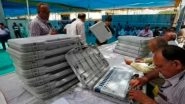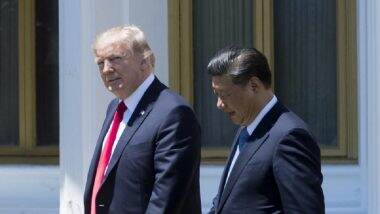Washington D.C: United States President Donald Trump is all set to announce tariffs on Chinese imports on Thursday, a White House official said.
"The president will announce the actions he has decided to take based on USTR's 301 investigation into China's state-led, market-distorting efforts to force, pressure, and steal U.S. technologies and intellectual property," the official told local reporters. In section 301 of the trade act, the U.S. government has given itself the power to unilaterally impose sanctions against countries which it decides are not trading fairly.
Donald Trump is preparing to impose a package of USD 60 billion in annual tariffs against China, following through on a long-time threat, which according to him will punish China for intellectual property infringement and help create more American jobs.
According to The Washington Post, senior aides had presented Trump with a USD 30 billion tariff package that would apply to a range of products. But Trump directed them to roughly double the scope of the new trade levies.
The package could be applied to more than 100 products, which Trump argued were developed by using trade secrets the Chinese stole from the U.S. companies or forced them to hand over in exchange for market access.
The Trump administration opened an investigation last August, acting on a series of allegations against China -- including that as a condition of doing business, China forces U.S. companies to enter joint ventures and transfer technology and trade secrets to domestic partners and that US companies are not able to license intellectual property in China as freely as Chinese companies. U.S. officials also allege China has hacked U.S. networks and conducted industrial espionage to steal US intellectual property.
The U.S. may also seek to bring complaints to the World Trade Organisation, trade officials said. America's top trade negotiator, Robert Lighthizer, told members of Congress on Wednesday the U.S. is looking to put "maximum pressure on China and minimum pressure on US consumers".
Lighthizer said protecting intellectual property is critical to the US economy. "It's an enormously important issue," Lighthizer said at the House Ways and Means hearing. "We think it is perhaps the most important thing that will have been done in terms of rebalancing trade."
The U.S. government said the decision to take these actions come after years of talks about the issue that failed to produce change.
Chinese Premier Li Keqiang on Tuesday had said that China did not want to enter into a trade war with the United States, adding that the war would only damage the relationship between the two sides. He further said that there will be no winner from any trade war between China and the United States, and that he hopes both sides can remain "calm".
If implemented, the tariff package could draw retaliation from China, further fraying the trade partnership between two of the world's largest economies. The U.S. trade deficit with China ran to a record $375 billion last year -- but U.S. exports to the country were also at a record.
The decision to impose tariffs on China comes just weeks since Trump short-circuited White House deliberations and announced a raft of sanctions on foreign-produced steel and aluminum. That move prompted the resignation of White House's top economic advisor Gary Cohn, sparked a global stock market selloff, and threats of retaliatory measures by trade partners.
(The above story first appeared on LatestLY on Mar 22, 2018 08:27 AM IST. For more news and updates on politics, world, sports, entertainment and lifestyle, log on to our website latestly.com).













 Quickly
Quickly











